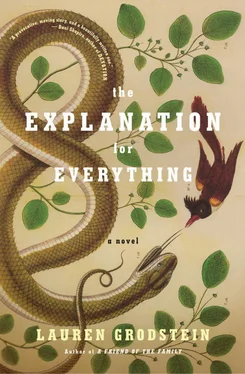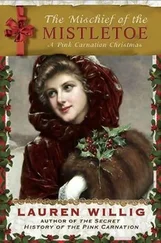For an instant they smiled at each other. “So if I cut the giraffe can I keep the thesis?”
What could he say? “Cut the bombardier beetle too.”
She nodded, folded her paper into her backpack. “Well, thanks again, Dr. Waite. How’s everything with your mice, by the way?” She’d gotten what she wanted, so now she was cordial.
“Eh,” he said. “I’m supposed to finish a grant application, but it’s tough going. I can’t replicate my initial findings.”
“So then what?”
“So then—” He flicked on his computer, a signal that he was planning on getting to work and she could leave. “So then I don’t get the money.” She stayed quiet. “And I suppose I start to feel even more insecure about everything my research is supposed to prove.”
“Does this affect your job here?”
“Not really,” he said. “But it doesn’t help.”
“Are you worried?”
Who would even ask that? “Sure, sometimes. I mean, it’s better to have a job than not to have one. And my girls—I need to provide for my girls.”
She looked thoughtful. Her eyebrows were knitted.
“Anyway, it will all work out,” he said in his class-dismissed voice. He swiveled toward his computer. The monitor was frozen on the welcome page.
“Your girls will be okay,” Melissa said.
“Will they now?”
She ignored his sarcasm. “It’s a cliché, but it’s true—kids are so resilient. Lots of dads change jobs. I mean, I’m sure you’re not in danger, but worst case—” He looked at her. She was tucking a hair behind her ear. “Worst case, I’m sure you guys will figure out another happy way to live.”
“It’s just that they’ve already been through a lot.” She was still looking at him so intently. “Their mother is gone.”
“My dad left when I was two. The guy I call my dad is actually my stepdad.”
“Oh.”
“And he’s a good guy and everything but he’s not so great at keeping a job. We’ve been foreclosed on, we had to live with my aunt for a while. Now there are five of them living in a two-bedroom apartment. They just had to move again. I’m the only one who got away.”
“That sounds tough.”
She shrugged. “Things aren’t always easy, I guess is my point, but you know what? You ask my brothers and they’ll tell you they’re happy. They play football, don’t really care that they get free lunch at school. And me too! I mean, I’m in college! Can you even believe it?” Had he ever met someone like her before, someone who was so literally transformed by a smile? “Anyway, your kids have a great dad. That’s really what matters.”
“I guess.” This wasn’t the sort of thing he usually discussed with students, with anybody.
“Look, I don’t want to sound like a nag or anything but you really might want to take a look at some of the books I gave you. They’re really good at pointing out the bigger picture.”
“Melissa—”
“I’m just saying.”
“Thank you,” he said, curtly.
“Oh, it’s no problem, really,” she said, leaving him to his cluttered office and the computer that refused to turn on.
GOD IS A RAINBOW was still in his bathroom while Belle took a bath (she still preferred long, dreamy sessions in the bathtub to the brisk efficiency of the shower); he picked it up when he brought her a fresh towel, moved it to the kitchen countertop, left it there.
“Dad, what’s this?” Nosy Rachel, making tomorrow’s lunches. “This isn’t the sort of thing you usually read. What is it, a kid’s book?”
“It belongs to one of my students,” he said, frowning over Rachel’s shoulder as she peered at the jacket photo.
“You’ve got some wackadoo students,” she said.
His plan that night was to go over his data, try to see any inconsistencies. In a one-man lab it was so easy to get things wrong: he could have adulterated the ethanol, mixed up the specimens, poorly recorded the levels they were drinking, fudged his brain scans. Every part of his experiment required attention to detail, which was a quality he prized in himself when he was a graduate student but now felt almost impossible to achieve. The milk in his fridge was past its expiration date; the girls had permission slips for school a week overdue. Well, at least he’d fill out the permission slips. Melissa’s book glared at him from his countertop. It was that or sleep or his dysfunctional notebooks; the book disheartened him the least. He filled out the slips, then took it to the den.
The book was written and self-published by Stephen and Michelle F. Cling, the husband-and-wife pastor team who tended the flock of the Hollyville Mission Church in Hollyville, New Jersey. Melissa Potter’s pastor and his wife. They were writing from the perspective of small-town theologians, not scientists, and they began by presenting a folksy summary of who they were and what their flock was like (this was a word they actually used, flock ). But in reading their description of Hollyville and its Mission Church, Andy found himself, despite himself, charmed. This part of New Jersey, south and west of the pines, was still mostly family farms, specialty crops, tomatoes, peaches, lettuce. Not enough land for agribusiness, not enough real-estate pressure to sell out for new developments.
The Clings described their town as two stoplights and a general store, the kind of place that made Mount Deborah seem bustling by contrast. The kids drove tractors before they drove cars, and spent summer nights swimming at the quarry. And everyone went to church on Sundays: Hollyville Mission or their friendly competitors, Hollyville Baptist and Hollyville Word of God. After church, neighbors ate lunch together, and the kids and old people took naps.
It sounded like a nice enough life, or a nice enough life to keep reading about, anyway. And as he read, Andy found himself admiring the Clings for other reasons. Primarily, in their two hundred pages of Christian chitchat, they didn’t pretend to know more about evolution than people who were actually trained in evolutionary biology. In fact, as the Clings moved from small-town history to introductory theology, their book spent only a few pages on evolution. It assumed that its readers believed in a God who created the earth and everything on it in seven days, so it didn’t spend much time trying to argue that notion. Instead, it talked about why people were here in the first place—why God had even bothered.
And because the book wasn’t trying to seem scientific, and because he found Stephen and Michelle’s prose style charming, complete with anecdotes from the church and diversions into song lyrics they both liked, Andy found himself unexpectedly immersed in God Is a Rainbow. That first night he read until one in the morning, and the next night too, and the next, keeping it by his bed and reading from it at night when he couldn’t sleep, or when an ephemerally horrifying dream woke him up at four in the morning. He found himself slowing down, in fact, so that he wouldn’t finish it too fast, and underlining the passages he liked: the church luncheon menus, softball games on neighboring farms. He imagined Melissa helping her mother make fried chicken, blueberry pie with blueberries from New Jersey bogs. He was surprised by how much these images pleased him: her large forearms beating down pie dough, her cross resting above her breastbone, shining under the church’s stained glass.
He read the book for two week’s worth of late nights, memorizing, despite himself, the comforting words of Stephen and Michelle Cling. It wasn’t all tractors and quarries and pies. There was religion here too, but under the spell of all that pie Andy couldn’t help but take in the religion. “You are here because of divine will,” the Clings said. “You are here because God wanted you to be here.”
Читать дальше












